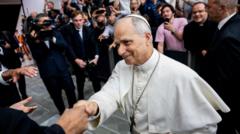Pope Leo XIV, in his first address to the media as the new leader of the Catholic Church, made a poignant appeal for the release of journalists imprisoned for their commitment to uncovering the truth. Addressing the audience in the Vatican’s Paul VI audience hall, the Pope stated that the suffering endured by these journalists should move nations and global communities to action. He pointed out that as of 2024, a staggering 361 journalists are currently incarcerated, highlighting the ongoing challenges faced by those in the profession.
The Pope identified press freedom as an essential element of democracy and stressed that the media’s role should focus on illuminating issues of injustice and poverty rather than fostering division or engagement with fanaticism. “Communication must be capable of listening and amplifying the voices of the voiceless,” he declared, urging media professionals to embrace a more compassionate and insightful approach to their work.
In his remarks, the Pope also expressed concerns about the ethical implications of artificial intelligence in journalism, advising reporters to utilize AI responsibly and for the greater good. The media’s responsibilities, he reiterated, should align with the principles of humanity as a whole.
Opening his speech with lighthearted humor in English, "Thank you for this wonderful reception," he acknowledged the enthusiastic reaction from the audience while reinforcing the urgency of positive communication. "We do not need loud, forceful communication," he stated, emphasizing the importance of sharing stories that honor the dignity of individuals.
Pope Leo XIV’s call for unity and compassion in journalism sets a tone for his papacy, underscoring the vital role of the media in fostering a more just society.
The Pope identified press freedom as an essential element of democracy and stressed that the media’s role should focus on illuminating issues of injustice and poverty rather than fostering division or engagement with fanaticism. “Communication must be capable of listening and amplifying the voices of the voiceless,” he declared, urging media professionals to embrace a more compassionate and insightful approach to their work.
In his remarks, the Pope also expressed concerns about the ethical implications of artificial intelligence in journalism, advising reporters to utilize AI responsibly and for the greater good. The media’s responsibilities, he reiterated, should align with the principles of humanity as a whole.
Opening his speech with lighthearted humor in English, "Thank you for this wonderful reception," he acknowledged the enthusiastic reaction from the audience while reinforcing the urgency of positive communication. "We do not need loud, forceful communication," he stated, emphasizing the importance of sharing stories that honor the dignity of individuals.
Pope Leo XIV’s call for unity and compassion in journalism sets a tone for his papacy, underscoring the vital role of the media in fostering a more just society.




















